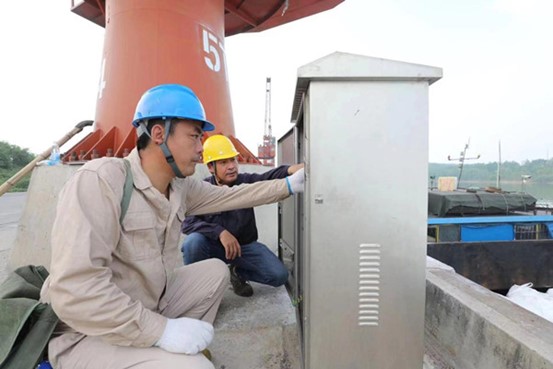
Staffers from State Grid Xuzhou Power Supply Co check a smart cloud-management platform for shore power monitoring and fast power charging in Xuzhou, Jiangsu province, on April 9. [Photo provided to chinadaily.com.cn]
In the prefecture-level city of Xuzhou in East China's Jiangsu province, the existing Beijing-Hangzhou Canal — zigzagging some 1,797 kilometers from the north to regions south of the country's longest river of Yangtze — passes through it.
The country's resolve in stronger ecological conservation and environmental protection has made the city stringent with ships travelling on the city's section of the grand canal, which has a history of over 2,500 years.
Shen Xiaojie, a staffer from the Xuzhou Power Supply Co of the State Grid — which shoulders a dual task of safeguarding the country's energy security as well as its economic lifeline — said in the past, ships travelling on the canal relied on diesel-driven generators for power, leading to pollutants on the water as well as "oily smells" inside the ship cabin.
Stringent environmental protection has forced them to help the ship owners to replace the diesel with electricity, thus making the water on the grand canal cleaner, she said.
On April 9, the State Grid Xuzhou Power Supply Co cooperated with the port authorities of Xinyi Port in Xuzhou to launch a smart shore-power cloud management platform, realizing an integrated management of berth reservation, shore power monitoring and fast charging for ship powers, she said.
"We connect the port shore power with the regional energy management and control system, and share the data on the smart shore-power cloud platform," said Ma Guangcheng, Shen's colleague, adding that "the staffers can monitor the operation status of the shore power facilities in real time, and perceive any abnormality in advance through big data, thus letting the port staffers and the ship owners rest assured."

Staffers from State Grid Xuzhou Power Supply Co check electricity facilities on the banks of the Beijing-Hangzhou Canal in Xuzhou, Jiangsu province, on April 9. [Photo provided to chinadaily.com.cn]
"My ship is equipped with a large-capacity battery compartment and inverter. With fast power charging, the battery compartment can be fully charged during the time of landing and unloading goods," said Liu Guangqin, a ship owner, adding that "the electricity for lighting and air conditioning on the way all comes from batteries, and the 'oily smell' of diesel generators is a thing of the past, and our life on the boat is more comfortable."
"I can see that water in the grand canal is also becoming cleaner," he said.
Wei Qiangqiang, also from the State Grid Xuzhou Power Supply Co, noted that previously, their electric power on the banks of the grand canal was mainly used to meet the domestic needs of the boats, and the charging of boat batteries still depended on diesel-driven generators.
Now, his company has also expanded the power distribution capabilities on both sides of the canal, fully meeting the demand for ships' domestic electricity consumption and the rapid charging of their batteries, he said.
Source: By By Zhuang Qiange and Pang Bo, chinadaily.com, Apr. 19, 2024 [https://www.chinadaily.com.cn/a/202404/19/WS6622115fa31082fc043c2e9d_1.html]

